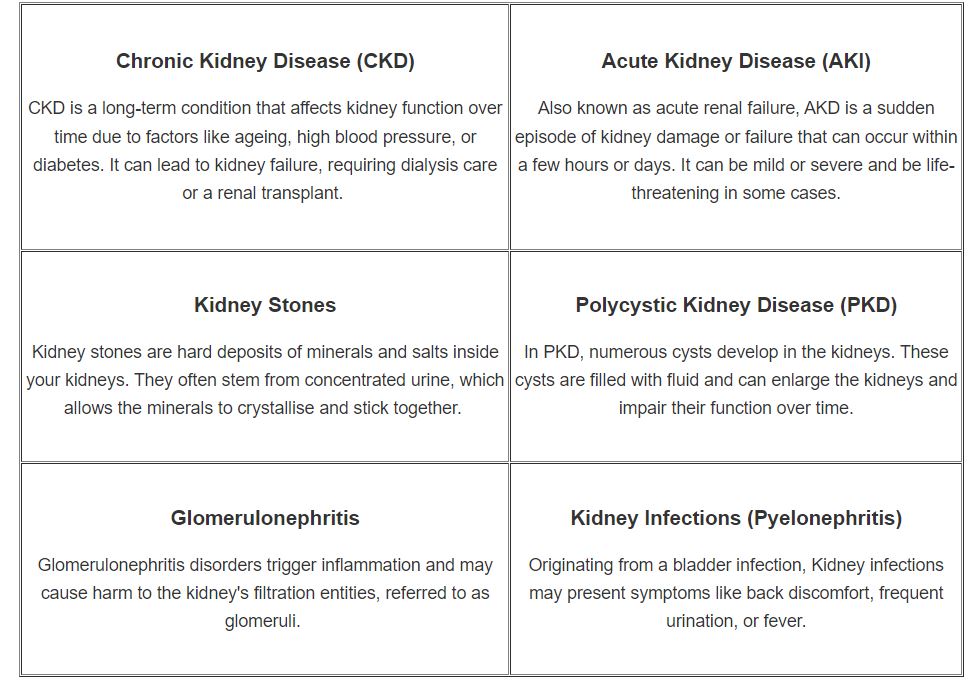
The kidneys are powerhouse cleaners of the body. They filter about 120 to 150 quarts of blood daily and expel around 1 to 2 quarts of urine, which carries away waste materials and toxins. They are also crucial in maintaining the body’s overall fluid balance, regulating the levels of various minerals like calcium and phosphate, and producing hormones that control functions like blood pressure and red blood cell production.
Synopsis
Common Kidney Diseases Impairing the Proper Functioning of the Kidneys
Common kidney diseases impairing the proper functioning of the kidneys include:

Diet Plays an Important Role in Renal Health
So, ensure you follow a balanced, healthy diet consisting of fresh fruits, vegetables, and whole grains, minus processed meals and refined sugar or fats. Drink more water (at least 3 litres every day) and watch what you eat to keep your kidneys healthy. Other major factors for optimal renal health would be to keep your blood pressure and sugar levels under control, quit smoking, and have routine medical appointments.
Consult a nephrology hospital in Bangalore if you want to learn more about Kidney Healthy Foods.
What Foods to Consume for Optimal Kidney Health?
Maintaining optimal kidney health is significantly influenced by dietary choices. A kidney-friendly diet can help keep these vital organs functioning properly, prevent the buildup of wastes and fluids, and manage associated conditions like hypertension and diabetes.
1. Berries
Berries like cranberries, blueberries, and strawberries are good for kidney health. It is due to their antioxidants, which can fight oxidative stress linked to chronic kidney disease (CKD). Cranberries can help prevent urinary tract infections (UTIs), which can lead to kidney infections if left neglected.
2. Fatty Fish
Salmon, mackerel, and sardines are rich repositories of omega-3 fatty acids and are known for their anti-inflammatory prowess. Consuming these fatty acids can help reduce inflammation – a common issue found among most patients suffering from CKD.
3. Nuts and Seeds
Almonds, chia seeds, and flaxseeds bring to the table a good blend of healthy fats, protein, and essential nutrients like magnesium. However, eating too much of foods high in phosphorus can be harmful to the kidneys. Thus, limit to only moderated consumption of such foods.
4. Whole Grains
Whole grains like quinoa, bulgur, and whole-grain pieces of bread are a rich source of dietary fibre and essential nutrients. Whole grains help control blood sugar - a major risk factor for kidney disease.
5. Apples and Pears
With a lower potassium content compared to many other fruits, apples, and pears are kidney-friendly choices. Their dietary fibre content aids blood sugar regulation and cholesterol-lowering, promoting overall kidney health.
6. Legumes
Beans, lentils, and chickpeas are protein-packed and fibre-rich, supporting kidney function when consumed in moderation due to their high potassium and phosphorus content.
7. Garlic and Onions
These aromatic vegetables are excellent for adding flavour sans sodium, which is beneficial for blood pressure control and, subsequently, kidney health.
8. Cauliflower
Cauliflower is a nutrient powerhouse, rich in vitamin C, vitamin K, and B vitamin folate. Its fibre content and anti-inflammatory compounds further accentuate its status as a kidney-friendly vegetable.
Conclusion
Embrace a kidney-friendly diet to nurture your renal health, and for personalised guidance, schedule a consultation with our expert nephrologists at Manipal Hospital Old Airport Road, Bangalore, today. Your step towards better kidney health is a step towards a healthier you.
FAQ's
Kidney disease at an early stage may not have significant signs. Sometimes, there will be noticeable symptoms like exhaustion, increased blood pressure, swellings of fingers, feet, and face, and changes in urination frequency.
Kidney diseases affect some people more than others. Diabetes patients, those with high blood pressure, and people with a history of inherited kidney diseases are at a major risk for developing kidney disease.
There are a variety of ways you can manage and overcome kidney disease. Start with eating healthily, taking prescribed medicines regularly, and going for periodic medical checkups. Visit Manipal Hospitals today to meet our best nephrologists in Bangalore.





















 5 Min Read
5 Min Read







.png)









